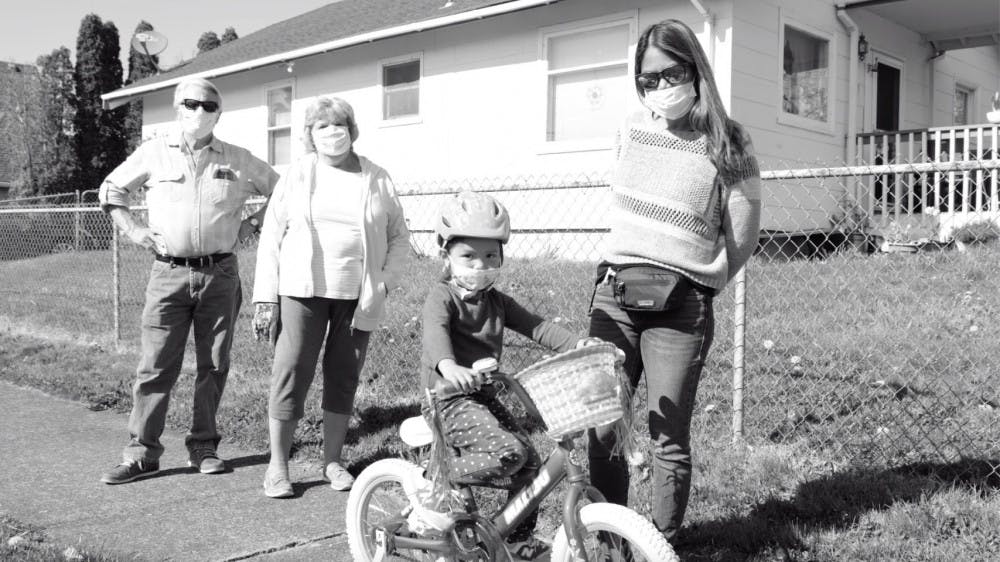A project started by Western’s Library and Archives aims to preserve the experiences of students and faculty during the pandemic

By Corinna Cook
Classes are all online, clubs and gatherings are postponed and campuses remain eerily empty. This is a unique experience, so Western Washington University is inviting students and faculty to share their thoughts and feelings during the pandemic and play a direct role in recording history.
Western’s Heritage Resources began a project called Telling Our Stories: Western’s Response to COVID-19. The goal is to collect stories in nearly any media form to archive the experiences of students and faculty during the COVID-19 pandemic.
“I have no doubt that COVID-19 is going to be something that researchers, faculty [and] students are going to be interested in for a very, very long time,” said Elizabeth Joffrion, the director of Heritage Resources at Western and the mind behind the project. “We’re encouraging folks just to write a paragraph or two about their experiences.”
Archiving is different from other types of research and preservation. Archivists need to anticipate what researchers will be interested in and actively collect materials to make them available for the future, Joffrion said.
But the archive has only received a handful of submissions.
The project webpage highlights some potential prompts such as how well people are transitioning to online classes or how the pandemic has changed peoples’ daily routines.
The urge to archive and preserve memories of this time have hit some people harder than others. Sophia Marble, a recent alumna of Fairhaven College at Western, started the Hassle of the Tassel, a project aimed toward anyone who is graduating during the pandemic.
“Human to human stories are, to me, what make up the human experience and what helps us all relate to each other on this earth,” said Marble.
Like the archive’s Telling Our Stories project, Hassle of the Tassel has not received many submissions. Marble said this is partly because she didn’t want to take up media space to advertise while the Black Lives Matter movement is happening.
However, Marble does want to use her project to uplift the voices of Black, Indigenous and people of color who may not be as present in current university archives.
On a larger scale, the Whatcom County Library System has been running a similar project: Peoples’ Perspectives: COVID-19 in Whatcom County, which acts as an umbrella, compiling many smaller and similar projects all in one place. Both Marble and Western’s Heritage Resources projects are linked in the collection.
“[Peoples’ Perspectives] is a multimedia invitation to the community to share and record their experience of the pandemic,” said Rebecca Judd, library director for the City of Bellingham, and the one who proposed the project.
“It’s so easy to think, ‘Oh, I’ll remember’ or ‘People will remember what this time was like,’ but boy, you forget the details quickly,” she said. “It’s important to record the sights and the smells and some of the day-to-day experiences.”
Peoples’ Perspectives offers a wide range of interactive projects, including some that are specifically geared toward young children or students.
“It’s ‘you do what you’re inspired to do’ and we’d love to hear from people,” said Christine Perkins, the executive director of the Whatcom County Library System.
Peoples’ Perspectives provides a way for the community to search for the projects they are interested in. Everything is gathered in one place, and when the stories are published, they are organized and searchable. This is to ensure the information is accessible and nothing gets lost, said Perkins.
Lauren McClanahan, a Western professor and instructor at the Bellingham Youth Media Project, submitted a photo she took on one of her daily walks.
“Here’s this otherwise typical family just taking a walk in the afternoon, but they have these masks on,” she said. “And it was this visual image that was so striking to me.”
McClanahan asked the family for a photo, and they agreed. The photo was submitted to the Capturing COVID Life Project, one of the many projects listed in the Peoples’ Perspectives database.
McClanahan also submitted the photo to the Essence of Bellingham photo contest, where it won in the people category. Each year, the winning photos are hung in City Hall and displayed for a downtown gallery walk.
McClanahan hopes the stories will help people learn how to respond to hardships with empathy and humility. She specified that this applies to more than just the pandemic, including the Black Lives Matter movement.
“I believe that individual stories can help humanize what we’re going through,” she said.
Since no one can predict when the pandemic will end, these projects have no set end date.
“As long as COVID-19 is impacting our lives, we’ll keep the project going,” said Joffrion, the director of Western’s heritage resources.
According to Judd and Joffrion, there are projects like these all over the country, many spearheaded by museums, libraries and other universities.
“These student stories are important,” said Joffrion. “They’re the ones that are facing this future, whatever it’s going to be.”





